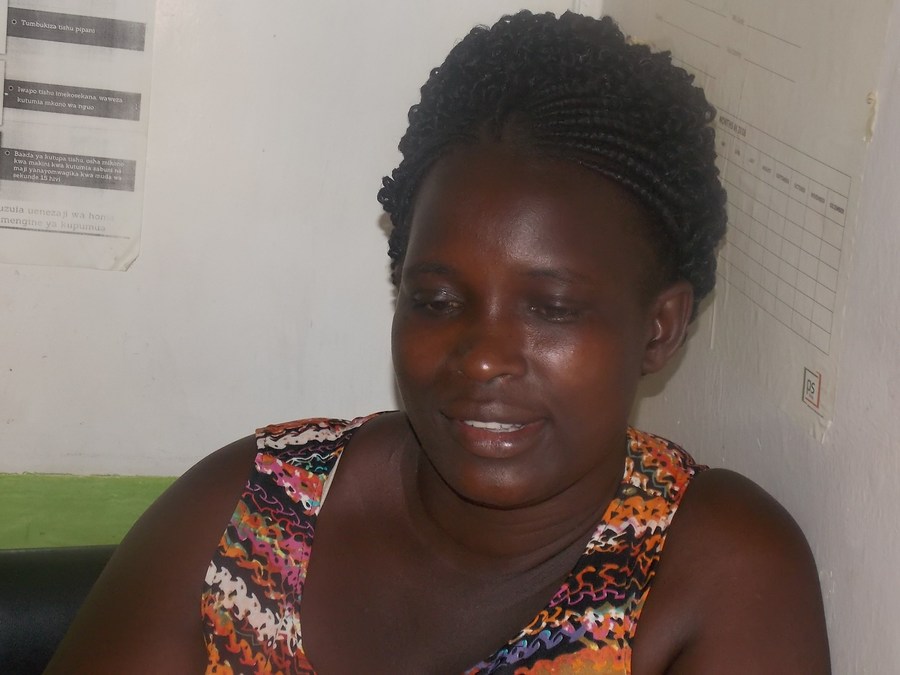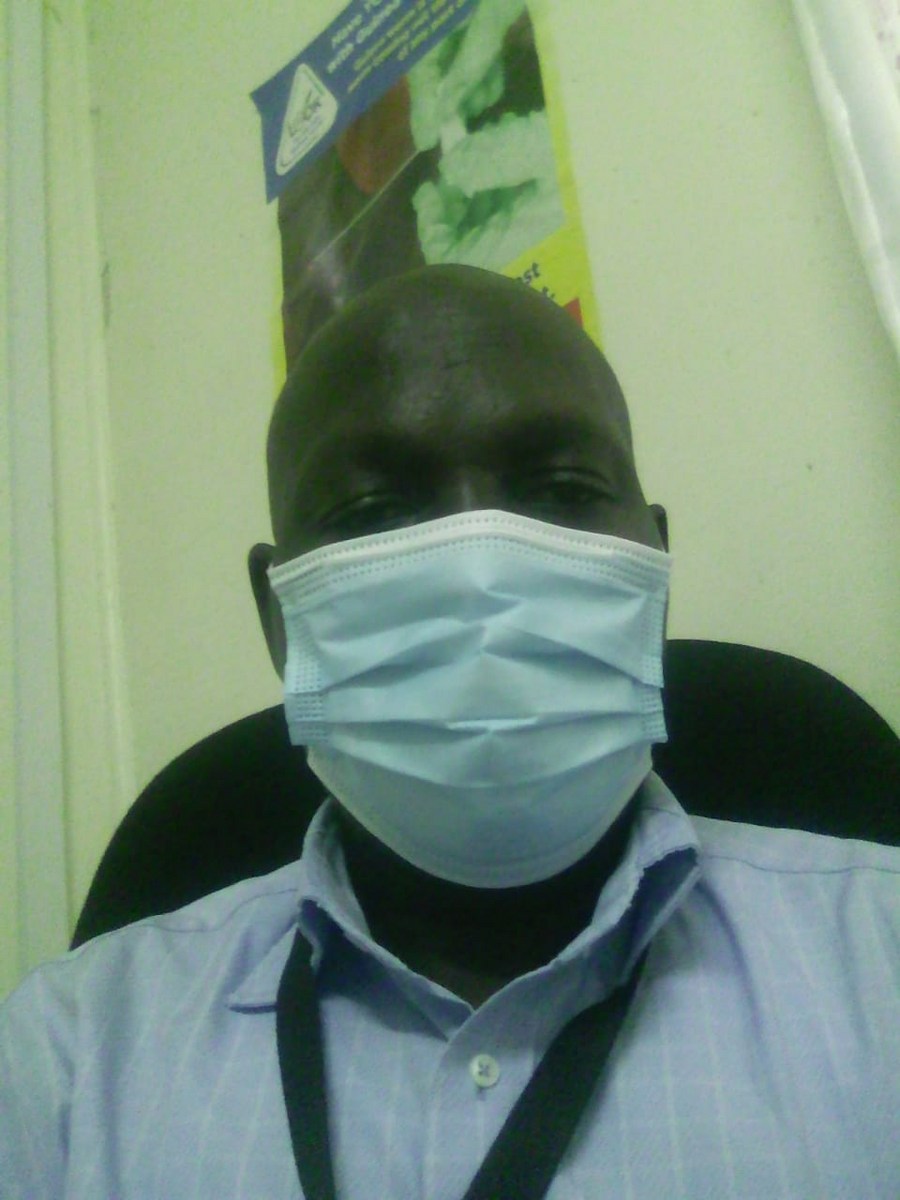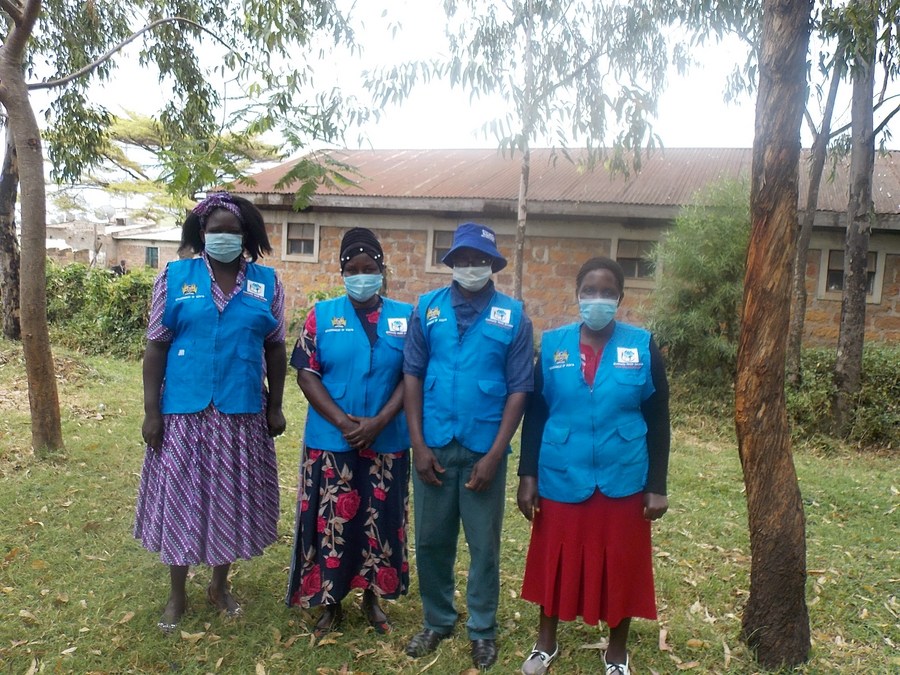
Jael Onditi, a community health volunteer in Shauri Yako, Homa Bay town, Kenya. (Xinhua/Peter Mutai)
Some 3,000 community health volunteers in Kenya's Homa Bay County are on the frontlines to promote disease prevention in remote villages. They have been crucial to the battle against vices such as HIV/AIDS, cholera and TB.
NAIROBI, March 25 (Xinhua) -- Jael Onditi is a community health volunteer (CHV) that supplements the formal health system in promoting disease prevention in remote villages in western Kenya.
She is based in the western Kenyan county of Homa Bay where she has been promoting environmental hygiene in the last 15 years to curb the spread of communicable diseases like cholera.
"Together with the residents, I developed a three-day program to help keep the environment clean, a move that has saved the residents from contracting cholera and other waterborne diseases," Onditi told Xinhua.
Onditi is a trained CHV by the Ministry of Health on antenatal care, use of malaria kits and testing of tuberculosis cases in the villages.
She helps local people to follow up on their appointments such as immunization dates, sanitation clean-up operations, ensuring that HIV/AIDS positive people go for their medication promptly.
"We are forced to give priority to the community over our family since most of the time we are woken up early in the morning, sometimes in the middle of the night depending on the emergency," said Onditi.
As part of her work, Onditi ensures that everyone in the village uses the toilets correctly, ensures that children wastes are properly disposed of, keeps their food wastes, removes standing water and keeps cleanliness within the corridors.
Richard Muga, executive committee member of Health Services in Homa Bay County, said that CHVs have brought about an increasing behavior change in the broader health care sector.
He said that CHVs have the potential to supplement the formal health system at a time when infectious, nutritional and non-communicable diseases have become common.
"The CHVs have been found to be leading facilitators of success as they help find solutions in fixing health problems that initially proved stubborn to the government," said Muga.
The CHVs, he added, are now allowed to enter households in their villages to check how communities live and report back for action.
Mathews Ajwala, community health officer in Homa Bay County, said their main role is to follow up on COVID-19 follow-ups, providing mosquito nets to needy cases, ensuring that mothers seek maternal health and following up on sanitation issues.

Mathews Ajwala, Community Health Officer in Homa Bay County said CHVs and the local village administrators hold quarterly meetings where they discuss new challenges and develop new work plans. (Xinhua/Peter Mutai)
"They are allowed to conduct Rapid Diagnostic Test (RDT) for malaria and recommend patients transfer to a medical facility," said Ajwala.
He said that CHVs are the first to attend to sick people since they carry out referrals to health facilities from households.
Ajwala said that Homa Bay County that has for decades been associated with frequent cholera outbreaks and a high rate of HIV transmission has 2,936 volunteers.
"Throughout the 80s and 90s, Homa Bay County has faced the danger of cholera, malaria and HIV/AIDS causing massive deaths of innocent people," said Ajwala.
He said volunteers are guided by the Community Health Act that has since become law and spells out their role in society.
"Each CHV visits 100 members of the community under her/his care daily, attending to their daily health needs and reports back to the Community Health Assistant (CHA) for immediate action," said Ajwala.
He said that all the households are linked to a health facility within their locality where they report for treatment and those on regular medication access their medicine.
Ajwala said that volunteers are however allowed to carry basic medicine like painkillers in their medical kits but not antibiotics.
"They have been very useful in identifying people suffering from pneumonia, tuberculosis, COVID-19," said Ajwala.
He said that it's the volunteers' continuous work during the outbreak of the COVID-19 pandemic that has led to the closure of the two quarantine health facilities that were opened to cater to COVID-19 infected people.

Community Health Volunteers were at the Kendu District hospital where they had gone to present their February 2021 monthly reports, Feb. 20, 2021. (Xinhua/Peter Mutai)
"We had a major cholera outbreak in 2007 and by 2019 we have recorded a 90 percent Open Defecation Free (ODF) category, up from 45 percent in 2009," said Ajwala.
He said that the success that leaves only 10 percent of villages still openly defecating is fully attributed to the work done by volunteers in educating and mobilizing communities to sink latrines.
Ajwala said that the high prevalence of cholera along Lake Victoria beaches has reduced.
"The CHVs have succeeded in making 162 villages ODF out of 3,323 villages in the entire county. A number of villages are also soon joining the list," said Ajwala.
On their role in managing HIV/AIDS, Ajwala said that volunteers are the success behind the reduction of HIV prevalence to 19 percent currently in Homa Bay County from 43 percent in 2016.
He said that through the volunteers, HIV defaulters are followed up and asked to report back to accessing their medicine and those with known signs are also encouraged to report for medical tests.
Moses Okelo is one such person who went back to receive his antiretroviral drugs after defaulting for three months.
"I defaulted having felt tired of taking daily medication but our local CHV came to my home and sweet-talked me back into the program," said Okelo.
He was diagnosed with HIV/AIDS in the year 2000 and continues to receive his medicines from a local dispensary without fail.
"I was cautioned that I will never be allowed back into the program again in case I default," said Okelo.
Ajwala said that CHVs have also helped improve the safe delivery of babies, antenatal care and immunization.
He said that tuberculosis management has improved as volunteers keep tabs on those on medication and visit them to inquire about side effects, adding that tuberculosis management in Homa Bay is currently the best in Kenya. ■




